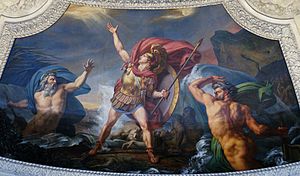
| Part of a series on | ||||||||
| Ancient Greek religion | ||||||||
|---|---|---|---|---|---|---|---|---|
 | ||||||||
| Origins | ||||||||
| Sacred PlacesSacred Islands Sacred Mountains Sanctuaries Other | ||||||||
Deities
|
||||||||
ConceptsWorldview
|
||||||||
PracticesWorship
|
||||||||
| Philosophy | ||||||||
Philosophers
|
||||||||
| Texts | ||||||||
| Other Topics | ||||||||
Scamander (/skəˈmændər/), also Skamandros (Ancient Greek: Σκάμανδρος) or Xanthos (Ξάνθος), was a river god in Greek mythology.
Etymology
The meaning of this name is uncertain. The second element looks as though it is derived from Greek ἀνδρός (andrós), meaning "of a man", but there are sources who doubt this. The first element is more difficult to pinpoint; it could be derived from σκάζω (skázō), "to limp, to stumble (over an obstacle)", or from σκαιός (skaiós), meaning "left(-handed), awkward". The meaning of the name might then perhaps be "limping man" or "awkward man". This would refer to the many bends and winds (meanders) of the river, which does not run straight, but "limps" its way along.
Geography
The Scamander River was named after the river god Scamander. The Scamander River was the river that surrounded Troy. The god Scamander took the side of the Trojans in the Trojan War.
Family
According to Hesiod, Scamander is the son of the Titans Oceanus and Tethys. He is alternately described as a son of Zeus.
Scamander was the father of King Teucer whose mother was the water nymph Idaea. He was also mentioned as the father of Glaucia, lover of Deimachus. Additionally, Xanthus was credited to be the father of Eurythemista who bore Pelops and Niobe to Tantalus. Strymo or Rhoeo, wife of Laomedon, king of Troy was also called his daughter. Lastly, he also became the father of the priest Melus by an unknown woman or nymph.
Mythology

Scamander fought on the side of the Trojans during the Trojan War (Iliad XX, 73/74; XXI), after the Greek hero Achilles insulted him. Scamander was also said to have attempted to kill Achilles three times, and the hero was only saved due to the intervention of Hera, Athena and Hephaestus. In this context, he is the personification of the Scamander River that flowed from Mount Ida across the plain beneath the city of Troy, joining the Hellespont north of the city. The Achaeans, according to Homer, had set up their camp near its mouth, and their battles with the Trojans were fought on the plain of Scamander. In Iliad XXII (149ff), Homer states that the river had two springs: one produced warm water; the other yielded cold water, regardless of the season.
According to Homer, he was called Xanthos by gods and Scamander by men, which might indicate that the former name refers to the god and the latter one to the river itself.
In a story by Pseudo-Plutarch, Scamander went mad during the mysteries of Rhea and flung himself into the river Xanthus, which was then renamed to Scamander.
Trojan descendants
See also
Notes
- "Skamandros". Behind the Name.
- "Scamander". Mythology Names.
- Hesiod, Theogony 345 & 366–370
- Philostratus the Elder, Imagines 2.8; Ptolemy Hephaestion, New History Book 4 (summary from Photius, Myriobiblon 190)
- Scholia ad Euripides, Orestes 11
- Apollodorus, 3.12.3
- Ptolemaeus Chennus 6.17, as epitomized by Photios I Myriobiblon 190
- Homer, Iliad 20.74, 21.146.
- Pseudo-Plutarch. "XIII. Scamander". De fluviis. Translated by Goodwin.
References
- Hesiod, Theogony, in The Homeric Hymns and Homerica with an English Translation by Hugh G. Evelyn-White, Cambridge, Massachusetts., Harvard University Press; London, William Heinemann Ltd. 1914. Online version at the Perseus Digital Library.
- Homer, The Iliad with an English Translation by A.T. Murray, Ph.D. in two volumes. Cambridge, Massachusetts., Harvard University Press; London, William Heinemann, Ltd. 1924. Online version at the Perseus Digital Library.
- Tsotakou-Karveli. Lexicon of Greek Mythology. Athens: Sokoli, 1990.
| Ancient Greek religion and mythology | |||||||||||||||||||||||||||||||||||||||||||||||||||||||||||||||||||||||||||||||||||||||||||||||||||||||||||||||||||||
|---|---|---|---|---|---|---|---|---|---|---|---|---|---|---|---|---|---|---|---|---|---|---|---|---|---|---|---|---|---|---|---|---|---|---|---|---|---|---|---|---|---|---|---|---|---|---|---|---|---|---|---|---|---|---|---|---|---|---|---|---|---|---|---|---|---|---|---|---|---|---|---|---|---|---|---|---|---|---|---|---|---|---|---|---|---|---|---|---|---|---|---|---|---|---|---|---|---|---|---|---|---|---|---|---|---|---|---|---|---|---|---|---|---|---|---|---|---|
| |||||||||||||||||||||||||||||||||||||||||||||||||||||||||||||||||||||||||||||||||||||||||||||||||||||||||||||||||||||
| |||||||||||||||||||||||||||||||||||||||||||||||||||||||||||||||||||||||||||||||||||||||||||||||||||||||||||||||||||||
| Ancient Greek deities | |||||||||||||
|---|---|---|---|---|---|---|---|---|---|---|---|---|---|
| Early deities | |||||||||||||
| Titans |
| ||||||||||||
| Olympian deities |
| ||||||||||||
| Water deities |
| ||||||||||||
| Personifications |
| ||||||||||||
| Other deities |
| ||||||||||||